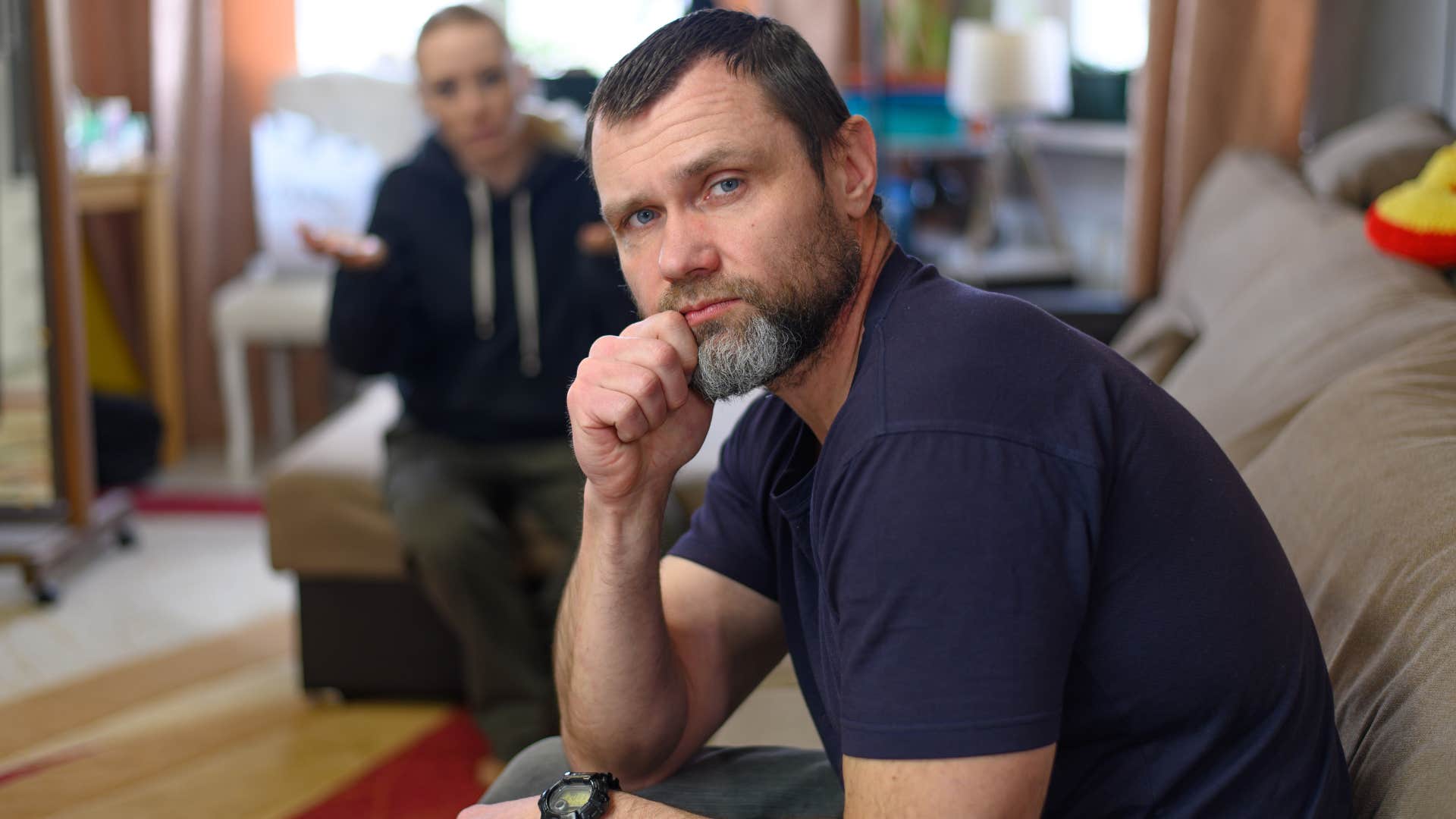11 Reasons Adult Children Sever Ties With Their Parents
It's not an easy decision, but one that many adult children are forced to make.
 fizkes | Shutterstock
fizkes | Shutterstock Navigating relationships with a parent in adulthood isn't easy for anyone, whether you were lucky enough to live a peaceful and happy childhood or the opposite.
Nearly 20% of adult children argue their relationship with their parents is "poor," according to a study from Pew Research Center, yet many still stick around to reap the consequences of a dysfunctional dynamic.
Others, motivated by the many reasons adult children sever ties with their parents, opt for "no contact" relationships, arguing that the choice was one of the "the best decisions" they could have made to protect their own wellbeing and a potential future where a healthier connection is possible.
Here are 11 reasons adult children sever ties with their parents
1. They feel unheard
 Olha Nosova | Shutterstock.com
Olha Nosova | Shutterstock.com
According to a study from the Journal of Humanistic Psychology, people feel most heard, especially in foundational relationships like those with a parent, a therapist, or a partner, when there's a safe space cultivated for active listening, open conversations, and trust. When a parent, whether in childhood or adulthood, fails to prioritize an environment like this, many children feel inherently misunderstood.
As their lives become more complicated, riddled with work problems and family planning, this demand for attention, compassion, and a listening ear from their parents becomes increasingly difficult and, for many, it's not worth the fight.
2. They're tired of being constantly criticized
 Srdjan Randjelovic | Shutterstock.com
Srdjan Randjelovic | Shutterstock.com
While parents tend to note conflict as the biggest driver of frustration in their relationships with adult children, according to a journal article from The Gerontologist, their kids argue it's actually "communication and interaction style" that creates toxic space between them. They not only feel misunderstood, but harshly criticized, even when they're only looking for support from their parents.
Often sparked by a difference in values, beliefs, and lifestyle habits, this generational divide is impossible to address without communication styles, and often sparks more anxiety in the lives of frustrated adult children and their parents.
3. They have unresolved childhood trauma
 Violator22 | Shutterstock.com
Violator22 | Shutterstock.com
According to a study published by the Healthcare Counseling and Psychotherapy Journal, many adult children with unresolved childhood trauma are unable to adequately cope and heal from psychological trauma and neglect at the hands of their parents when they're still experiencing it, even to a smaller degree. When their parents continuously dismiss or fail to acknowledge this trauma, it greatly affects their childrens' ability to protect themselves, cultivate healthier connections, and move forward.
Many have a different memory or experience from their parents about the health of their own childhood, so it can manifest as one of the huge reasons adult children sever ties with their parents. They need space to acknowledge it, heal, and move forward, without feeling judged or misunderstood.
4. They don't feel like their boundaries are respected
 Hrecheniuk Oleksii | Shutterstock.com
Hrecheniuk Oleksii | Shutterstock.com
Like Anne Catherine suggests in her book "Boundaries: Where You End and I Begin," setting boundaries for adult children from dysfunctional family dynamics can be incredibly uncomfortable, but massively influential in protecting emotional health.
They not only provide a sense of space for your own self-interests, esteem, and protection, but spark flexibility to ensure interactions with family members are productive, healthy, and compassionate, rather than hostile. When parents actively dismiss, degrade, or overstep those boundaries, they're not only sacrificing your own emotional well-being, they're prioritizing their own perceived entitlement to your space and energy.
5. They've found supportive healing energy in other relationships
 Odua Images | Shutterstock.com
Odua Images | Shutterstock.com
With harmful discourse that suggests estrangement and "no contact" relationships with parents is simply "a fad" or a trend in younger generations — despite new wave energy that's shed light on this complex and largely misunderstood practice — many adult children haven't been able to get the clarity they need from their parents in older generations.
Instead, they look to their inner circle — partners, friends, and even therapists — to seek the healing energy they need. Sometimes, space from their parents is exactly what's preventing them from focusing on that energy, giving them the potential to return to those relationships with a better, healthier, and more grounded perspective on their own trauma.
6. There's active emotional abuse
 Anatoliy Karlyuk | Shutterstock.com
Anatoliy Karlyuk | Shutterstock.com
While many of the reasons adult children sever ties with their parents are encompassed in niche emotions and overarching issues, the main reason many make this difficult decision is emotional abuse, according to a 2015 study from the University of Cambridge.
Every interaction drains their energy, instills an innate sense of guilt, or leaves them feeling misunderstood. Instead of trying to constantly protect their feelings or avoid difficult conversations, adult children make this difficult decision to create space, protecting themselves from toxic "people-pleasing" tendencies and shame.
7. They're not accepted as adults
 Fizkes | Shutterstock.com
Fizkes | Shutterstock.com
Many children with unresolved trauma from or around their parents struggle with feeling unheard and misunderstood in their adult lives — either because their parents still view them as their childhood selves, or their new identity, beliefs, and values are largely disrespected.
Never given the space to grow up or unlearn toxic habits from their childhood, they feel stuck in a place where they can't be their new, truest, and healthiest selves without judgment from their parents during every conversation or interaction.
8. Their mental health struggles are dismissed
 ViDI Studio | Shutterstock.com
ViDI Studio | Shutterstock.com
Parental narcissism greatly affects a child's personal development, mental health, and self-esteem, according to a 2014 Smith College research paper, causing many adult children to feel inherently unworthy, unloved, and unsupported by their parents. With the tendency for these same children to develop more deep-rooted mental health concerns in adulthood, it's not surprising that the root of them would prefer to avoid accountability and shift blame.
Of course, there's ways to cope and heal from the consequences of these mental health struggles, but when a parent or a part of that deep-rooted trauma dismisses them and victimizes themself, oftentimes the only way to move forward is to restrict contact with them.
9. Their parents habitually deflect accountability
 Fizkes | Shutterstock.com
Fizkes | Shutterstock.com
According to hypnotherapist Nancie Barwick, many parents with narcissistic tendencies that have caused harm in their children's lives view themselves as "superior" over their children. They refuse to accept constructive criticism from their children and constantly deflect the accountability their children need to move forward from childhood trauma.
They'd prefer to adopt a belief that their children are manipulative and immature, rather than come to the conclusion that they have apologies to make and things to heal from themselves. With this innate inability to take accountability, many children prefer to restrict contact, in an effort to protect their own emotional well-being and boundaries.
10. They have unempathetic parents
 Wavebreakmedia | Shutterstock.com
Wavebreakmedia | Shutterstock.com
While the majority of parents and children will tend to disagree on experiences from the past, the important factor that sets healthy parents apart from toxic ones is their ability to empathize with their kids' emotions, feelings, and struggles.
Even if they don't believe they've done something wrong, healthy parents are willing to support their children and empathize with their emotions, helping them to heal and move forward.
11. They feel alienated from the family
 Perfect Wave | Shutterstock.com
Perfect Wave | Shutterstock.com
Healthy relationships between parents and their adult children revolve around empathy and understanding. Even if they don't have the same experience, they're willing to move forward towards reconciliation by acknowledging their desire for love and connection.
Parents who don't share that same dedication towards growth and accountability together will shift blame in arguments and victimize themselves to feel superior. By doing so, they not only harm their childrens' emotional health, but alienate them from a supportive environment where they can seek unconditional love.
This causes a great deal of adult children to feel alienated from their family and the community they're desperately seeking to reconcile with. Instead of living in a constant pursuit of that connection, many adult children choose to create space and cut ties to free themselves from toxic mental burdens.
Zayda Slabbekoorn is a news and entertainment writer at YourTango who focuses on health and wellness, social policy, and human interest stories.

